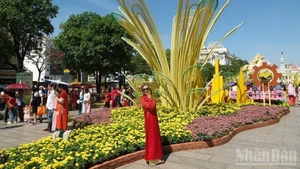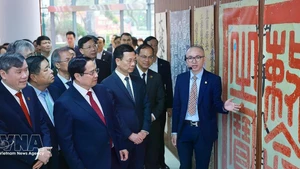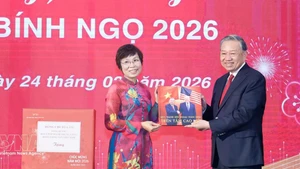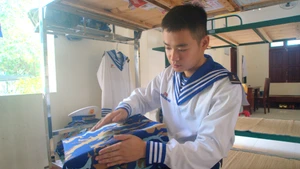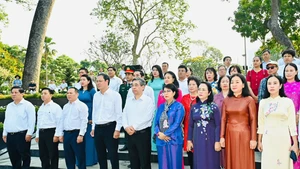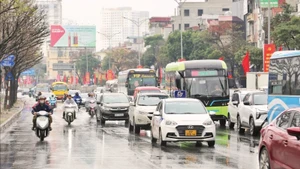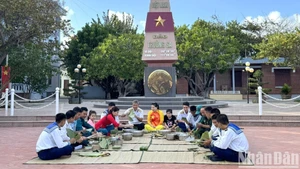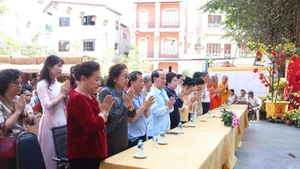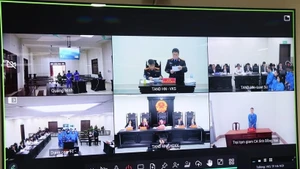From there, the localities have developed plans for training and fostering to improve the quality of grassroots-level cadres, in connection with the arrangement, rotation, and strengthening of specialised staff to meet practical requirements.
Consolidating organisation and apparatus
In line with the policy of the Central Government and Ha Tinh Province on reviewing, arranging, and restructuring civil servants at commune-level administrative units, right in the first working week of September 2025, the Party Committee of Cam Lac Commune (Ha Tinh) rotated six positions between the Party sector, mass organisations, and government.
According to Bient Van Thuyet, Secretary of the Party Committee of Cam Lac Commune, after more than two months of operating under the new government model, cadres and civil servants have made great efforts to overcome difficulties, quickly adapt to new tasks, and fulfil their duties. However, through practical work and results from the review of qualifications and expertise, the Standing Committee of the Party Committee has realised that some cadres have been working in positions not suited to their capacity, strengths, or qualifications, which limited their ability to maximise responsibility and efficiency. Therefore, the Standing Committee of the Party Committee has agreed to rotate cadres between the Party sector, mass organisations, and government to ensure the right person for the right job, consistent with their professional qualifications and expertise.
Nguyen Sy Hanh, who had just been rotated from the mass organisation sector to the economic office in charge of land management, shared: “I studied land management and had eight years of experience in this field at my former unit. Therefore, I boldly proposed to the organisation that I be transferred to a new position more suited to my expertise.”
In addition to Cam Lac Commune, other localities in Ha Tinh are also transferring commune-level cadres and civil servants from the Party sector and the Fatherland Front who have relevant expertise and experience to strengthen the government sector. At the same time, they are reviewing, proposing, and accepting non-specialised commune-level staff — former cadres and civil servants who were made redundant due to the rearrangement of commune-level administrative units in 2023–2025 — to work as commune-level cadres and civil servants in units lacking staff.
Ha Tinh Province has also requested provincial departments, branches, and public service units to review, compile lists, and second cadres, civil servants, and public employees in fields such as land management, construction, information technology, accounting-finance, law, and education and training to assist communes and wards, with completion required in September 2025.
According to leaders of localities in Ha Tinh, while there are cadres who are bold enough to request positions matching their strengths and professional competence, there are also some reluctant to take on positions in fields such as finance and land management. Therefore, local leaders always stress and commit that Party committees and authorities at all levels will always accompany them, prioritise collective interests, and stand ready to sacrifice individual benefits for the overall efficiency of the apparatus and the improvement of public service quality.
Proactive in overcoming difficulties
In the context of increased workloads, with many new, difficult, and unprecedented tasks, Party committees and authorities at all levels in Thanh Hoa, Nghe An, and Ha Tinh have promoted a high sense of responsibility, ensuring the smooth and stable operation of the new apparatus. Many localities have devised good and timely practices.
In Tam Hop Commune (Nghe An), after merging four communes, the population rose to nearly 43,000 people. Every day, the commune administrative centre receives more than 100 dossiers. Cao Duc Trung, Secretary of the Party Committee of Tam Hop Commune, said that along with local residents, some households from neighbouring communes also came to conduct transactions, leading to an overload in the daily number of dossiers received.
However, commune cadres and civil servants have proactively applied information technology in managing and operating the Public Administrative Service Centre, such as effectively using the VNPT-iOffice software and digital signature system, as well as publicly listing all administrative procedures. As a result, the commune has received and processed administrative procedures fully, promptly, and within the prescribed timeframe.
Recognising that transactions during office hours were overloaded, the commune’s People’s Committee introduced the “Saturday for the People” model. This initiative in Tam Hop differs from many other localities in the province as the commune brought all equipment directly to villages, with commune leaders and specialised cadres personally receiving, guiding, and resolving administrative procedures relating to land, civil status, notarisation, certification, and social policies.
According to the Organisation Commission of the Thanh Hoa Provincial Party Committee, given the surplus and shortage of cadres and civil servants, especially in mountainous communes, the Standing Committee of the Provincial Party Committee has issued a policy to transfer and arrange cadres from surplus communes and wards to those lacking staff, and from lowland and midland areas to mountainous and disadvantaged areas.
The highlight of these policies is that in addition to prioritising the appointment of cadres and civil servants who volunteer to work in difficult areas to suitable leadership and management positions (if available), Thanh Hoa has also introduced specific support mechanisms for each group.
Specifically, cadres, civil servants, and public employees from provincial departments, boards, and sectors, as well as communes and wards, who are transferred or seconded to mountainous communes will receive allowances of 1.75 times the basic salary per person per month if working in the 47 communes of the six former mountainous districts: Muong Lat, Quan Hoa, Quan Son, Lang Chanh, Ba Thuoc, and Thuong Xuan.
For those transferred or seconded to 29 communes in the lower mountainous areas of five districts (Ngoc Lac, Thach Thanh, Cam Thuy, Nhu Thanh, Nhu Xuan), the allowance is 1.25 times the basic salary per person per month. The support period is as stated in the decision on transfer or secondment, and ends when cadres, civil servants, or public employees are assigned to units outside the supported communes.
Truong Anh Quy, Deputy Head of the Cadre Organisation Division (Organisation Commission of the Thanh Hoa Provincial Party Committee), said that in the Party sector alone, about 35% of commune and ward cadres in the lowland areas have submitted voluntary applications to work in mountainous communes. Currently, most mountainous communes are staffed with sufficient cadres and civil servants. Cadres, civil servants, and public employees transferred to mountainous communes have made efforts to perform well in their tasks, contributing to initial improvements in the quality and effectiveness of leadership, administration, and public service.
In the Party sector alone, about 35% of commune and ward cadres in the lowland areas have submitted voluntary applications to work in mountainous communes. Currently, most mountainous communes are staffed with sufficient cadres and civil servants. Cadres, civil servants, and public employees transferred to mountainous communes have made efforts to perform well in their tasks, contributing to initial improvements in the quality and effectiveness of leadership, administration, and public service.
Truong Anh Quy, Deputy Head of the Cadre Organisation Division (Organisation Commission of the Thanh Hoa Provincial Party Committee).
Thanh Hoa Province has also issued budget support norms for localities to repair and upgrade essential facilities and equipment to serve the working needs of cadres, and to build or repair official housing for cadres and civil servants stationed in mountainous communes, with specific funding levels. Accordingly, communes, wards, and relevant agencies that are rearranging administrative units (excluding those receiving district-level Party and government offices) are supported with 2.5 billion VND per lowland commune/ward, 4 billion VND per low mountainous commune, and 5.5 billion VND per high mountainous commune.
In the long term, to overcome the shortage of civil servants, leaders of communes and wards in Thanh Hoa, Nghe An, and Ha Tinh have proposed that the standing committees of provincial Party committees continue to transfer and receive civil servants between communes and wards to balance staffing levels; permit the acceptance of civil servants from experts, scientists, public employees, non-specialised commune-level staff, and young volunteer intellectuals; and allow communes and wards to sign labour contracts for certain tasks.
Central ministries and sectors need to review, study, and promptly resolve any overlaps and inconsistencies in applying legal provisions on local government organisation and specialised laws in areas such as justice, home affairs, investment, construction, agriculture, and environment.

